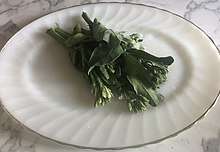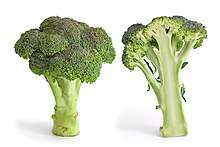Gai lan
Gai lan or kai-lan (Brassica oleracea var. alboglabra)[1] is the Cantonese name for Chinese broccoli[2] or Chinese kale; jie lan is its Mandarin name. It is a leaf vegetable with thick, flat, glossy blue-green leaves with thick stems, and florets similar to (but much smaller than) broccoli. Another Brassica oleracea cultivar, gai lan is in the group alboglabra (from Latin albus "white" and glabrus "hairless"). When gone to flower, its white blossoms resemble that of its cousin Matthiola incana or Hoary Stock. The flavor is very similar to that of broccoli, but slightly more bitter (think a tad less bitter than broccoli raab--aka rapini). It is also noticeably stronger than broccoli.
| Gai lan | |
|---|---|
 Gai lan | |
| Species | Brassica oleracea |
| Cultivar group | Alboglabra Group |
| Origin | unknown |
| Gai lan | |||||||||||||||||||||||
|---|---|---|---|---|---|---|---|---|---|---|---|---|---|---|---|---|---|---|---|---|---|---|---|
.svg.png) "Gai lan" in Traditional (top) and Simplified (bottom) Chinese characters | |||||||||||||||||||||||
| Chinese name | |||||||||||||||||||||||
| Traditional Chinese | 芥蘭 | ||||||||||||||||||||||
| Simplified Chinese | 芥兰 | ||||||||||||||||||||||
| Hanyu Pinyin | jièlán | ||||||||||||||||||||||
| Jyutping | gaai3 laan4*2 | ||||||||||||||||||||||
| Literal meaning | mustard orchid | ||||||||||||||||||||||
| |||||||||||||||||||||||
| Burmese name | |||||||||||||||||||||||
| Burmese | ကိုက်လန် | ||||||||||||||||||||||
| Vietnamese name | |||||||||||||||||||||||
| Vietnamese alphabet | cải làn or cải rổ | ||||||||||||||||||||||
| Thai name | |||||||||||||||||||||||
| Thai | คะน้า [kʰā.náː] | ||||||||||||||||||||||
| RTGS | khana | ||||||||||||||||||||||
| Wikimedia Commons has media related to Brassica oleracea var. alboglabra. |
| Wikispecies has information related to Brassica oleracea var. alboglabra |
Hybrids
Broccolini is a hybrid between broccoli and gai lan, produced by Mann Packing Company, Inc.[3]
Cultivation
Gai lan can be sown in late summer for early-winter harvesting. Seedlings planted in autumn will last all winter. As with other plants, Gai Lan should be harvested and consumed just as white flowers start to bloom as the stems can become woody and tough when the plant bolts.
Uses
Gai lan is eaten widely in Chinese cuisine, Common preparations include gai lan stir-fried with ginger and garlic, and boiled or steamed and served with oyster sauce. It is also common in Vietnamese, Burmese and Thai cuisine.
In Americanized Chinese food, gai lan was frequently replaced by broccoli, when gai lan was not available.[4]
 Gai lan
Gai lan Baby gai lan served Cantonese style
Baby gai lan served Cantonese style Phat khana mu krop: Thai style fried Chinese broccoli with crispy pork belly
Phat khana mu krop: Thai style fried Chinese broccoli with crispy pork belly
References
- "Brassica oleracea L. var. alboglabra (L. H. Bailey) Musil". Germplasm Resources Information Network (GRIN). Agricultural Research Service (ARS), United States Department of Agriculture (USDA). Retrieved 23 August 2016.
- Patrick J. Cummings; Hans-Georg Wolf (2011). A Dictionary of Hong Kong English: Words from the Fragrant Harbor. Hong Kong University Press. p. 62. ISBN 9789888083305.
- "Broccolini". Washington State University. Retrieved 2018-08-14.
- Hung, Melissa (2019-10-31). "When authenticity means a heaping plate of Tex-Mex". San Francisco Chronicle. Retrieved 2019-11-05.
- "Chinese Kale (Gai Lan, Chinese Broccoli)". Evergreen Seeds. Retrieved 6 February 2013.
External links

